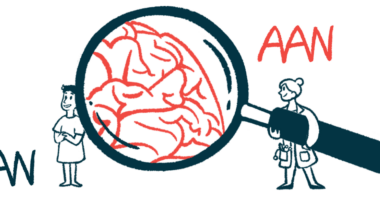Cost of Ultomiris for NMOSD may soon be reimbursable in Canada
Developer will work with provinces, territories to get therapy on drug plans

Ultomiris (ravulizumab), an approved infusion therapy for adults with neuromyelitis optica spectrum disorder (NMOSD), is closer to being eligible for reimbursement under public drug plans in Canada, according to its developer, Alexion, AstraZeneca Rare Disease.
The company signed a letter of intent with the pan-Canadian Pharmaceutical Alliance (pCPA). This government partnership negotiates drug prices for Canada’s provinces and territories, which manage their own public health programs. The letter outlines the terms and conditions for reimbursement of the therapy through participation in publicly funded drug programs.
“We would like to thank the pCPA for its partnership in recognizing the need for this important innovation for Canadians living with NMOSD and gMG,” Karen Heim, vice president and general manager of Alexion Canada, said in a company press release. “We look forward to our ongoing collaboration with provincial and territorial jurisdictions to finalize listing agreements and secure public reimbursement for patients and their caregivers.”
Alexion will now collaborate with individual provincial and territorial jurisdictions in Canada to have Ultomiris listed for public reimbursement on specific drug plans. The agreement also covers Ultomiris for generalized myasthenia gravis, another autoimmune disease.
“This agreement with the pCPA is a huge step forward to providing patients access to this treatment and improving treatment of NMOSD in Canada,” said Mark S. Freedman, MD, of the Ottawa Hospital in Canada.
Preventing relapses a major goal of NMOSD treatment
In most cases of NMOSD, the immune system wrongly produces self-reactive antibodies against AQP4, a water channel protein found at the surface of astrocytes, a type of cell that supports nerve cells. This can activate a part of the immune system called the complement cascade, ultimately leading to damaging inflammation in the spinal cord and optic nerves, which transmit signals between the eyes and brain.
The disease is marked by relapses, or flares, where symptoms suddenly get worse. These relapses can cause permanent disability, so preventing them is a major goal of NMOSD treatment.
“NMOSD is a rare neurological disease characterized by severe relapses that have significant impact on patients’ lives,” Freedman said.
Ultomiris, administered directly into the bloodstream every two months, is an antibody-based therapy designed to bind to the complement protein C5. This suppresses complement activation, helps control symptoms, and reduces the risk of disease relapses.
It’s approved in several countries for treating adults with NMOSD who test positive for anti-AQP4 antibodies. In Canada, Ultomiris was cleared for use in November 2023.
Ultomiris approvals supported by clinical trial data
The therapy’s approvals were mainly supported by data from a Phase 3 CHAMPION-NMOSD clinical trial (NCT04201262), which enrolled adults with NMOSD and anti-AQP4 antibodies who experienced at least one relapse in the year prior. All participants received Ultomiris.
Data from this trial were compared with relapse rates from NMOSD patients who received a placebo in the Phase 3 PREVENT trial (NCT01892345). This study supported the approvals of Soliris (eculizumab), Alexion’s older C5-targeted infusion therapy that’s approved for the same indication as Ultomiris, but given every two weeks.
Results showed no confirmed relapses among Ultomiris-treated patients after 72 weeks, or nearly 1.5 years, while nearly half of those in the external placebo group experienced relapses. This represented a 98.6% drop in the risk of relapse with Ultomiris relative to the placebo.
In CHAMPION-NMOSD, “all Ultomiris-treated patients remained adjudicated relapse free at week 72,” Freedman said. “This was achieved with a much-improved delivery regimen every 2 months compared to [Soliris] that is dosed every 2 weeks.”
Progress toward Ultomiris’ public reimbursement was met with enthusiasm by Sumaira Ahmed, an NMOSD patient and founder and executive director of The Sumaira Foundation, a nonprofit global patient advocacy group focused on NMOSD and other rare neuroimmune conditions.
“Ensuring NMOSD patients have access to therapies proven highly effective is a top priority for The Sumaira Foundation globally,” Ahmed said. “We are therefore very pleased to hear the news that [Ultomiris] is now becoming accessible to [AQP4-positive] NMOSD patients in Canada.”








